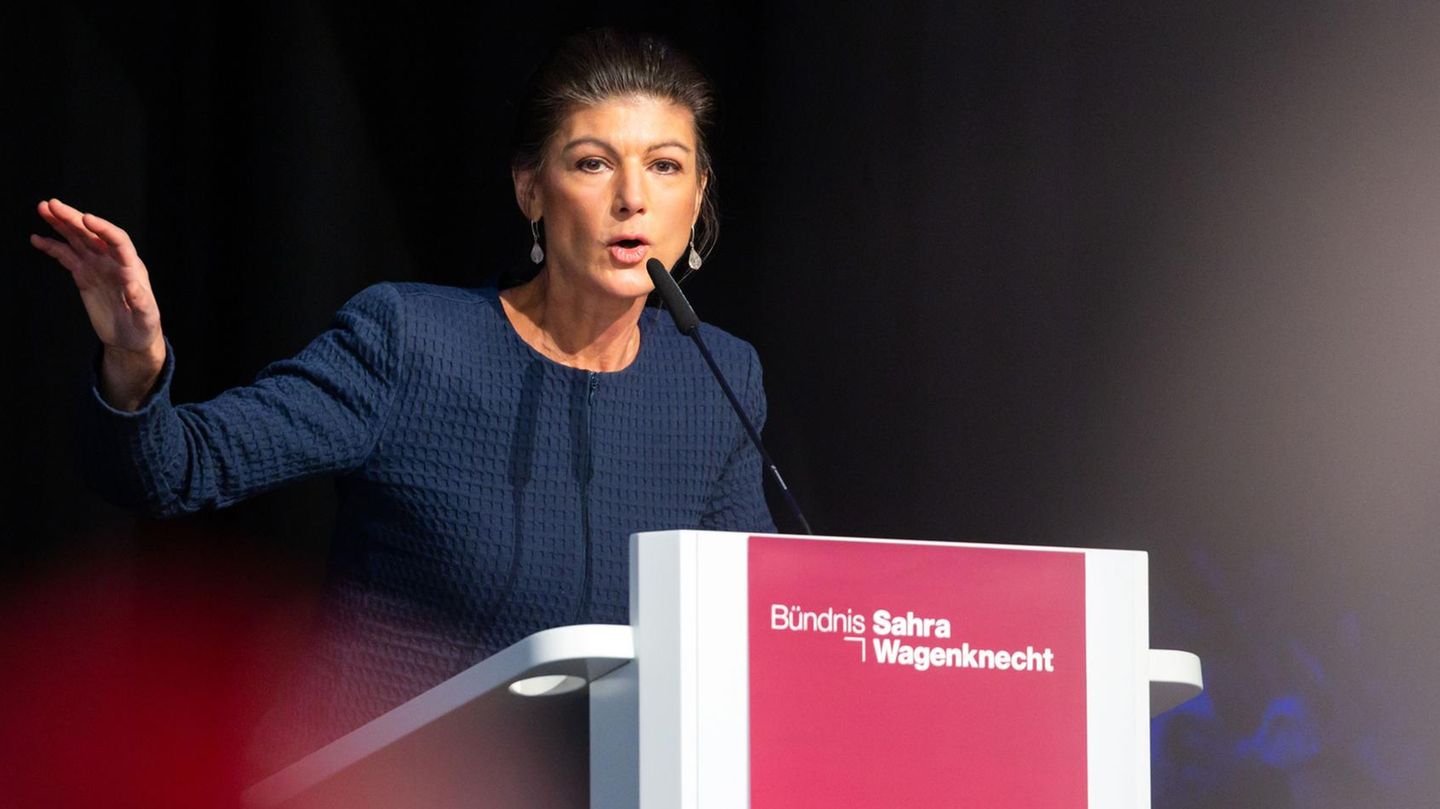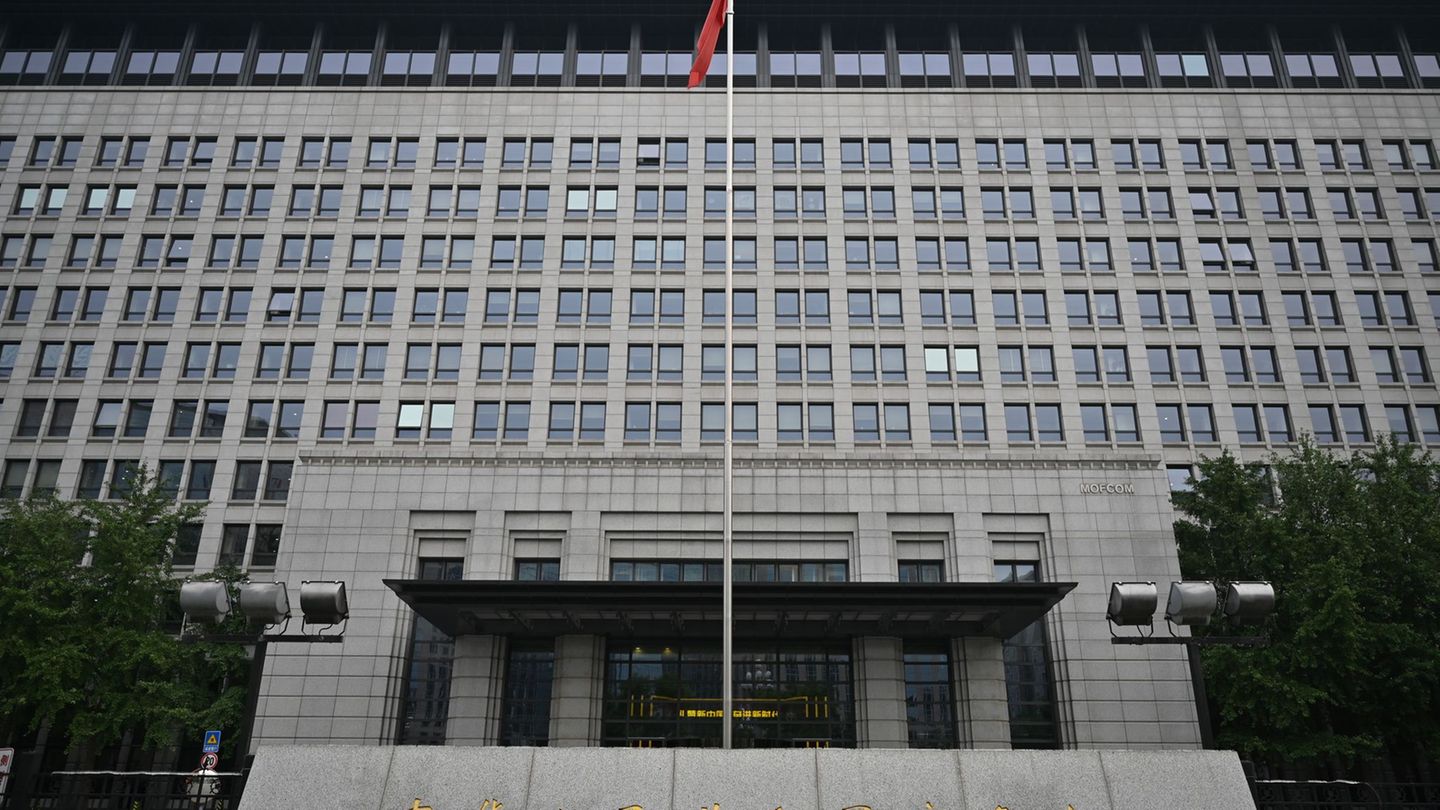Thuringian BSW party conference
Peace, joy, chariot driver
Copy the current link
Form a coalition with “warmongers”? Sahra Wagenknecht was against a blackberry coalition in Thuringia for a long time. Your BSW party friends saw it differently. Now it came to the debate.
Just when it comes to the most fundamental thing, the question of whether one should even agree to founding a joint state government with these “warmongers around Merz” – that’s exactly where the debate suddenly comes to a standstill. Unrest is spreading in the hall in tranquil Ilmenau, where the delegates from the Alliance Sahra Wagenknecht (BSW) met this Saturday to decide on the new Thuringian coalition agreement. There is a reason for the unrest: the woman named after her is due to arrive at any moment.
Around 100 delegates quickly leave the hall and form a line in the foyer. They want to give their federal leader an impressive reception – but then nothing happens. Finally someone calls out that there has been a misunderstanding: Wagenknecht has already come through the side entrance. The trellis dissolves awkwardly and the delegates return to the hall.
Before this little faux pas, they heard speeches from the two state chairmen, Katja Wolf and Steffen Schütz. Wolf, former mayor of Eisenach, is trying to get those present excited about the 120-page “blackberry coalition agreement” between the CDU, BSW and SPD. “Something very important can happen here for Thuringia – and also for the BSW,” she emphasizes. The contract not only symbolizes a new political constellation in the country, it is also intended to overcome intra-party differences in the BSW.
There had previously been violent internal disputes. When the CDU, BSW and SPD presented a first exploratory paper on October 18, Wagenknecht called it a “mistake”. An open power struggle followed between the state and federal associations. A sticking point: In the draft, Wagenknecht lacked clear, naturally negative statements about the planned stationing of US missiles in Germany – an issue that, for Wagenknecht and her supporters, is closely linked to the demand for a consistent peace policy.
Meeting in Ilmenau: The BSW agrees
Only the failure of the traffic light government at the federal level, the approaching new elections and the pressure of falling poll numbers led both sides to give in. The compromise that has now been presented is a signal of agreement: in the completed coalition agreement there is now the wording that stationing and use without German participation is viewed as “critical”. In addition, the term “peace” appears a total of 26 times.
In Ilmenau, the internal dispute between the federal and state associations appears to have been resolved. “It hurts my soul when people try to drive a wedge between Sahra and me,” says Wolf, referring to the federal chairwoman. She praises the party’s namesake: “We shouldn’t forget who made it possible for us to sit here and make new, responsible politics.”
Wagenknecht himself also appears emphatically conciliatory on stage. She only briefly touches on the dispute over the preamble to the treaty. “In the first draft we said, ‘No, this isn’t good enough.’ “We would have disappointed too many people,” she explains. Now, however, everyone seems happy – or at least ready to pull together.
The decisive vote was clear: with 2 abstentions and 26 votes against, 76 delegates voted for the contract.
The federal election campaign begins
The reasons for this unity are obvious. In view of fluctuating poll numbers between four and seven percent, the BSW urgently needs unity in order to even make it into parliament in the upcoming federal election. At noon it is clear: the BSW is united in order to clear the way for the so-called blackberry coalition in Thuringia – and thereby perhaps also secure its own political future.
And this afternoon will also be about this federal election: the young party is drawing up its list for the federal election. There is some anger in Ilmenau when it comes to nominations: When Thomas Schmid applied for second place on the list, a party friend accused him of being in the AfD. Schmid interjects in horror: “I was never in the AfD.” In the end he is not elected: Mayor Robert Henning and state parliament member Anke Wirsing end up in the first two places on the list.
Source: Stern
I have been working in the news industry for over 6 years, first as a reporter and now as an editor. I have covered politics extensively, and my work has appeared in major newspapers and online news outlets around the world. In addition to my writing, I also contribute regularly to 24 Hours World.






